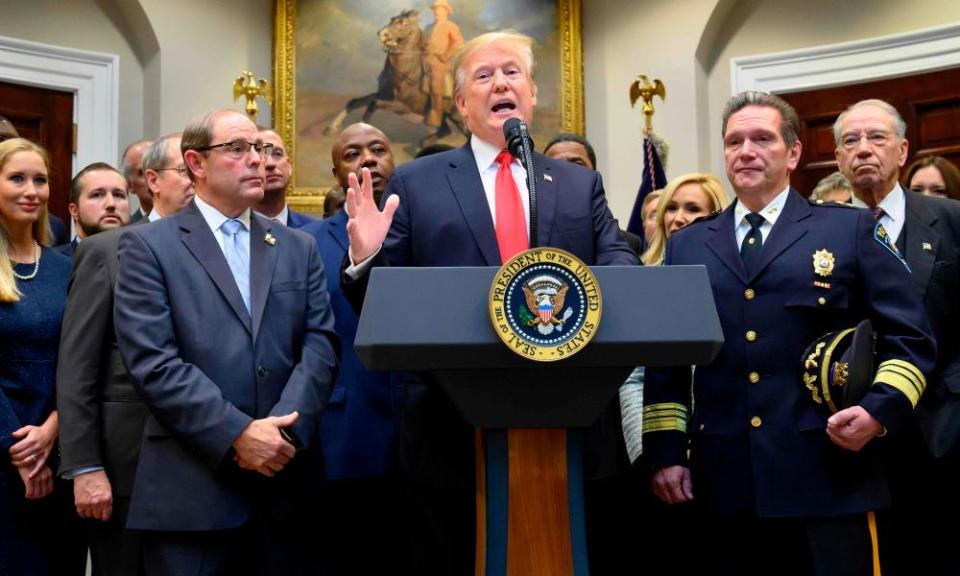Criminal justice reform bill passed by Senate in rare bipartisan victory
First Step Act, a landmark bill which would reduce drug crime sentences, saw support from both progressives and law-and-order conservatives

A sweeping bill seeking to reform the criminal justice system has cleared the Senate, in a legislative victory for both progressive advocates and law-and-order conservatives that would give judges more discretion when sentencing some drug offenders and would boost prisoner rehabilitation efforts.
The First Step Act, which passed 87-12, attracted support from both sides of the aisle, as well as from public figures such as Patricia Arquette, Mark Cuban, Kim Kardashian West and Kanye West. Donald Trump supported the iteration of the bill that passed in the House in May, and the most current version that will need to return to the House for another vote (which it is expected to pass), before it reaches his desk for a signature later this week.
The sweeping bill addresses concerns that the nation’s war on drugs had led to the imprisonment of too many Americans for non-violent crimes without adequately preparing them for their return to society.
“America is the greatest Country in the world and my job is to fight for ALL citizens, even those who have made mistakes,” Trump tweeted. “Congratulations to the Senate on the bi-partisan passing of a historic Criminal Justice Reform Bill.”
The president continued: “…This will keep our communities safer, and provide hope and a second chance, to those who earn it. In addition to everything else, billions of dollars will be saved. I look forward to signing this into law!”
The act would reduce mandatory minimum sentences for a number of drug-related crimes, allow judges to circumvent federal mandatory minimum sentences for non-violent offenders when they see fit, expand rehabilitative opportunities for federal prisoners, and ban some correctional practices criticized as inhumane, such as the shackling of pregnant women. The act would give elderly and terminally ill inmates a path home and invest tens of millions in re-entry programming.
The act would end so-called “three strikes” mandatory life sentences for defendants facing a third drug conviction, except for those with a prior “serious violent felony”. The “stacking” regulations that make it illegal to posses a firearm while committing a crime, even if the firearm is not used, would also no longer come into play.
The bill would also retroactively extend the 2010 Fair Sentencing Act, a move that could affect thousands of drug offenders serving disproportionately long sentences for crack cocaine versus the powder variant. As many as 4,000 people currently serving long sentences could be eligible for release, according to some advocates.
Jessica Jackson Sloan, the national director for #cut5o, a criminal justice reform advocacy group, applauded the Republican judiciary committee chairman, Chuck Grassley, and Dick Durbin, the Senate Democratic whip, for “leading their respective parties to consensus on one of the most important challenges our country faces – unwinding the catastrophic harm of the incarceration industry”.
“Tonight, we stand as neither Republican or Democrats but as people seeking to take the first step of many to criminal justice reform,” she said.
Grassley hailed a “big bipartisan victory”, saying: “Historic criminal justice reform happens once in a generation.”
Cory Booker, the New Jersey senator and possible Democratic presidential hopeful for 2020, said the nation’s prisons were full of Americans who are struggling with mental illness and addiction and who are overwhelmingly poor.
He said the nation’s criminal justice system “feeds on certain communities and not on others” and added that the bill represents a step toward “healing” for those communities.
“Let’s make no mistake, this legislation, which is one small step, will affect thousands and thousands of lives,” Booker said.
The ACLU, which initially opposed the House version of the legislation, tweeted that the First Step Act was “by no means perfect – but we’re in the midst of a mass incarceration crisis and the time to act is now. We’re glad to see common sense prevail in the Senate voting to move this bill closer to the finish line.”
The bill would affect only federal prisoners, who make up less than 10% of the country’s prison population.
